Hair Loss Vitamin Deficiency and Mineral Deficiency Treatments That Also Restore General Health
Most people who live in developed countries such as the United States are deficient in Iodine. Unless you specifically take a supplement like Iodoral or Lugol’s Iodine, you’re deficient. I can say this with confidence because of the ubiquitous presence of bromine and fluorine in the environment, in the food supply, in the water supply, and on or in products like electronics, children’s pajamas, new furnishings, and more. Bromine and fluorine both belong to the halogen group of elements on the periodic table along with iodine and chlorine. Though both molecular iodine and molecular chlorine are essential for human health, bromine and fluorine are toxins that can masquerade as these two elements inside the body, wreaking havoc on human health.In our research into cancer and autoimmune diseases, we’ve found that iodine deficiency is one of the top 3 most common causes or contributing causes of both. And studies on high-iodine herbal treatments for hair loss like Ecklonia cava / Ecklonia Kurome support the idea that Iodine deficiency plays a major role in hair loss. Iodine deficiency, after all, causes thyroid gland malfunction which directly impacts hair growth through a variety of mechanisms of action. Indeed, iodine deficiency also impacts gallbladder and liver health, reproductive organ health, and it also causes immune system dysfunction. When your body is properly charged with plenty of molecular iodine and potassium iodide (both of which are found in Lugol’s iodine), you’re literally marinating in a forcefield of natural disinfecting agents. Our sweat and our sebaceous glands naturally contain plenty of iodine when our bodies are not deficient and this iodine acts as a powerful, natural disinfectant. Iodine deficiency, in other words, makes us susceptible to infection simply by not being present on the outer layer of skin. But what about hair loss?
What Causes Hair Loss? Iodine Deficiency and Bromine Toxicity
Iodine deficiency has always been a problem. If soils are deficient in iodine, people don’t get enough of it from their fruits and vegetables. Cows and other food-animals that graze grasses that are iodine deficient lead to meats that are deficient in iodine. For this reason, Lugol’s iodine was the most commonly prescribed medicine by doctors back in the early 1900s, before the American Medical Association (AMA) was established to ensure that doctors would be prescribing primarily petroleum-based pharmaceuticals as profitable, patentable treatments that would cover up symptoms without ever curing disease.Iodine deficiency, you see, causes a diversity of strange symptoms that are different from one person to another. Recently, for example, I was working with a family whose mother developed hypothyroidism while the father had Myasthenia Gravis and the daughter was diagnosed with breast cancer. All of these health problems are ultimately caused by iodine deficiency combined with bromine toxicity. We’ll talk about bromine toxicity in a moment, but the point I want to make here is that each person in that family was suffering with iodine deficiency, but each person had very different symptoms relating to the problem.
Below are common symptoms of Iodine Deficiency:
- Fatigue
- Swollen glottis
- Goiter (or even just very minor swelling of the thyroid gland)
- Thyroid nodules
- Depression
- Dry, flaky skin
- Leg swelling
- Muscle Cramps
- Hair thinning and hair loss
- Hypothyroidism
- More…
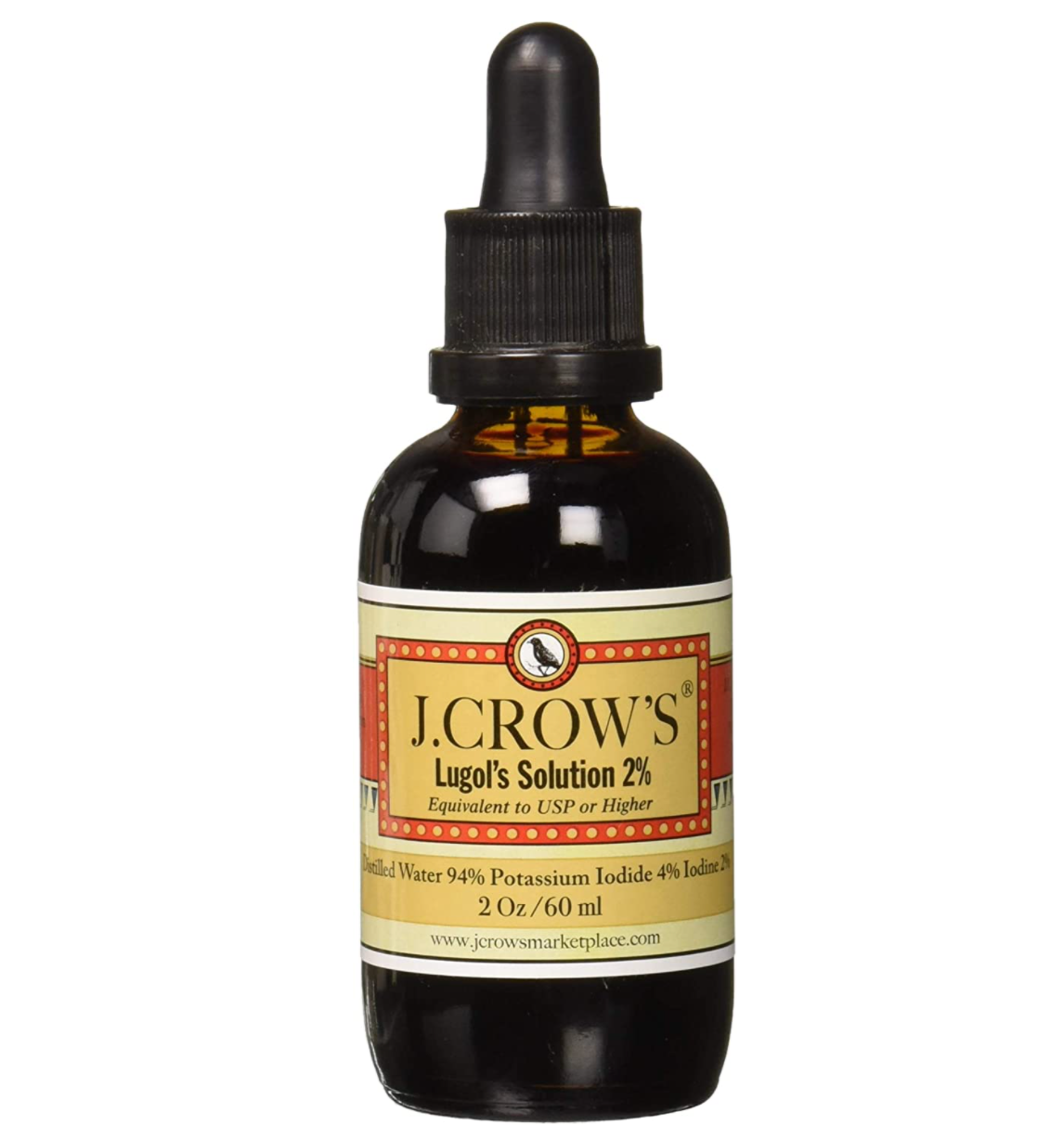
Bromine Toxicity
Bromine toxicity was not a common problem back in the 1900s. So if a patient arrived at the doctor’s office, a doctor would prescribe Lugol’s iodine and the patient would take it and feel better immediately. Today though, unfortunately, because both bromine and fluorine are distributed through the environment in developed countries and because these two substances are a part of our daily lives now, a person who takes Lugol’s iodine to begin remedying an iodine deficiency will first have to go through bromine detox symptoms before they’ll begin to feel better.Essentially, a person with iodine deficiency and bromine toxicity will have to feel worse before they can feel better because as you restore iodine to normal levels in the body, bromine and fluorine is kicked out of the thyroid gland, the reproductive organs, the gallbladder, and other organs and it enters the bloodstream to be removed via the kidneys. On its way out of the body, people will often notice that they develop a rash called bromaderma. They might begin to feel depressed or develop sores in their mouths or other weird symptoms caused by bromine and fluorine toxicity. These symptoms tend to last about 30 to 60 days and then they go away. After bromine and fluorine detoxification people usually feel amazing. Often, people who suddenly restore their iodine to normal levels and who no longer have bromine or fluorine in their bodies feel awake and alive again in a way that they haven’t felt for years.
So while you might experience a rash or other symptoms of bromine and fluorine toxicity as you begin taking Lugol’s iodine for the first time, it’s worth it.
Symptoms that people often experience while going through Bromine Detoxification include:
- Rash (bromoderma)
- Blepharospasm / Eye Twitching
- Drooping eyelids (ptosis)
- Joint Pain
- Insomnia
- Confusion
- Disorientation
- Auditory hallucinations
- Visual hallucinations
- Brain Fog
- Loss of control of body movements
- Foot twitching
- Tingling in the extremities
- Neurological impairment
- Psychosis
- Seizures
- Gastrointestinal problems
- Diarrhea
- Constipation
- Indigestion
- Somnolence
- Delirium
- Disturbance of color perception
- Dark thoughts (e.g. “there is no reason to live”)
- Depression (e.g. “there is no reason to get out of bed”)
- Mood issues such as anxiety or mood swings
- Mouth and tongue sores and cuts, a sore mouth
- Dry mouth
- Metallic taste in the mouth
- Odd swallowing sensation (also known as “swollen glottis” in the old medical literature)
- Body odor
- Bromide acne which is coniform (the use of zinc can help counteract bromide acne)
- Skin “cuts”
- Hair loss
- Brain fog
- Leg and hip ache that resembles arthritis
- Sinus pain
- Runny nose
- Headache
- Cherry angiomas
- Sedation/lethargy
- Unusual urine odor or color
- Urethral spasm and frequent urination (may be mistaken for a urinary tract infection)
- Diarrhea or constipation
- Vision changes
- Irritability
- Increased salivation
- Dream changes
- Impaired memory/concentration
- Tremor
- Hormone changes
- Kidney pain
- Breast tenderness / fibrocystic breast disease (this transient symptom typically resolves quickly with iodine treatment)
- Menstruation Issues
- Cystitis / bladder irritation
- Asthma / breathing problems
How the Thyroid Affects the Gallbladder and the Liver and Why It Matters In Terms of Hair Loss
If the gallbladder and the liver are not functioning properly, bile won’t be released in the proper quantities or at the proper time. This leads to digestive issues like simple indigestion, Leaky gut Syndrome, Small Intestine Bacterial Overgrowth (SIBO), Inflammatory Bowel Diseases like Crohn’s Disease, Ulcerative Colitis, or even Colorectal Cancer among other things. But most important for our discussion regarding hair loss is the fact that, without bile acting as a detergent that cleans the gut and that makes sure that fat-soluble vitamins are digested, certain nutrients may not be absorbed properly which can lead to vitamin and mineral deficiencies. Vitamin K2 and D3, for example, are two fat-soluble vitamins that play an extremely important role in restoring hair growth. But neither of these vitamins can be digested, if your liver/gallbladder are not releasing the proper amounts of bile at the proper time. Later, we’ll talk about how to do enzyme replacement therapy to overcome this problem during the initial stages of working to regrow hair, but for now, we’re simply going to talk about why you need iodine to restore health to the gallbladder/liver so that your body can produce the proper amount of bile naturally.At first glance, the gallbladder and the thyroid don’t seem to be strongly connected. In fact, most people might think that the function of one would have little to do with the other. But, actually, the health of the thyroid gland strongly impacts the health of the gallbladder and the liver. Click here to read more about the gallbladder-thyroid connection.
The thyroid gland, for example, plays a vital role in reproductive hormone balance, and the gallbladder and the liver are sensitive to the presence of (or lack of) certain reproductive hormones. The gallbladder and the liver, in turn, also affect thyroid health. In either case, iodine therapy can be a vital treatment for this problem.
Both hyperthyroidism and hypothyroidism can cause liver and gallbladder problems. Studies have shown that hyperthyroidism, for example, may be slightly more likely to result in the development of gallstones, but hypothyroidism is also a very strong risk factor for gallstones.
Interestingly, the Sphincter of Oddi has receptor sites for thyroid hormones. What this suggests, is that thyroid hormones play a direct role in how this sphincter works. Too little or too much of either of the thyroid hormones could thus cause problems not only for the thyroid, but also for the liver and the gallbladder. Research has shown that too little thyroid hormone causes “tension” in the Sphincter of Oddi, making it hard for it to relax enough to release bile as needed.
Besides its direct effects on the gallbladder, low levels of thyroid hormones can also cause a slow metabolism. A slower metabolism, in turn, causes the stomach to empty more slowly and less efficiently. This then leads to slowed bile flow because, without food to digest in the small intestine, the liver and gallbladder have no reason to release bile. This is another factor that can cause buildup of sludge or gallstones in the gallbladder. I
Finally, the thyroid affects the metabolism of cholesterol. And cholesterol levels directly impact reproductive hormone levels. Hypothyroidism, for example, causes higher-than-normal levels of LDL cholesterol. Since high cholesterol levels are a significant contributing factor in the development of gallstones, and in reproductive hormone level imbalances, it’s logical that problems with the thyroid’s ability to metabolize and “process” cholesterol would ultimately lead to more cholesterol-rich bile salts, gallstones, hair loss, and poor health overall.
 Click here to subscribe to the Living Database!
Click here to subscribe to the Living Database!
How the Gallbladder Affects the Thyroid (and How Insulin and Estrogen Connect Them)
When you consider how the liver and the gallbladder function in regard to the thyroid, you first have to know a couple of things about the liver including how thyroid hormones are processed and produced in the body to really understand how these various structures impact hair loss and regrowth. The thyroid hormone known as T4 (thyroxine) must be converted into an active form, T3 (triiodothyronine), in the liver. To make this conversion, the body must have sufficient amounts of healthy fats from the diet. As long as the body is able to process fats properly during digestion, the thyroid hormones can be produced on cue. If the gallbladder has been removed though, or if the gallbladder is blocked, or if the liver is blocked and congested or otherwise is not functioning properly, then the fats that a person eats in their diet won’t be digested properly. Bile is necessary for the breakdown of fats (and also for the absorption of healthy fatty acids and the fat-soluble vitamins, too). If bile flow is blocked or if bile flow is sporadic or not properly tuned to when food is moving through the digestive system, then fats won’t be digested and fat-soluble vitamins and fatty acids won’t be absorbed by the body. As such, the liver won’t be able to convert the T4 hormones into T3 hormones. Inadequate T3 levels lead to a variety of serious health problems, one of which is a slow metabolism.Note that iodine and tyrosine, an amino acid, must combine together to produce the thyroid hormones. If iodine levels or tyrosine levels are too low, thyroid hormones can’t be produced. So your body must also be able to digest and absorb proteins and amino acids like tyrosine in addition to iodine. As such, you might benefit from taking an array of enzymes to promote proper digestion and absorption of fats, proteins, and carbohydrates to ensure that you’re able to make use of the nutrients in foods and supplements. Click here to learn how to do Enzyme Therapy to improve digestion and overall health.
If the body doesn’t have sufficient levels of T4 hormone, the liver’s ability to metabolize cholesterol decreases. When this happens, cholesterol levels in the liver become higher than average. As a result, cholesterol levels in the bile also become higher. Higher amounts of cholesterol in the bile increase a person’s risk of developing gallstones since these higher quantities of cholesterol thicken the bile and make it more likely to become sludgy. Alterations in the amount of cholesterol in bile impacts reproductive hormone levels which, in turn, impacts hair loss and regrowth.
Insulin Resistance and Bile Dysfunction
When bile flow is lacking, either due to blockages, low bile production, or other factors, this can cause insulin resistance. Bile is necessary to keep blood sugar in check. Without sufficient bile flow, blood sugar levels increase to an excess. Bile acids are also required to activate receptors that regulate insulin sensitivity. Insulin resistance, as well as either type of diabetes, can therefore affect the health of the thyroid and hair loss since having too much or too little insulin can ultimately cause problematic changes in thyroid hormone production and its action in the body. While this is a somewhat indirect way that the gallbladder affects the thyroid, it’s still a vitally important and noteworthy connection. In summary, it’s important to realize that blood sugar levels play a role in causing hair loss. Notably, blood sugar regulation issues, Type 2 Diabetes, and Hashimoto’s disease (hypothyroidism) tend to go hand-in-hand and all of these health issues are relevant to the problem of hair loss. Gallbladder and liver problems are also extremely common in people who have any one (or all) of these health issues. As such, if you are iodine deficient, and your thyroid, gallbladder, and liver are all malfunctioning, you may also be lacking essential nutrients including amino acid building blocks that are used to make hair, and you may have insulin resistance and blood sugar issues that are also contributing to your hair loss problem. With this in mind, it’s easy to see how Iodine Deficiency can easily lead to hair loss problems!Click here to read more about how how to use Lugol’s iodine to cure diabetes and other pancreatic diseases.
Estrogen Levels and Hair Loss
Estrogen is another hormone that connects the gallbladder and the thyroid. The gallbladder (or rather, the bile that it releases) plays a crucial role in estrogen metabolism, meaning that the bile released by the liver and the gallbladder is necessary in order to process and regulate estrogen levels in the body. When the liver or gallbladder is sluggish or not producing enough bile, or when there is sludge or stones that are blocking the sphincters, the bile isn’t able to process excess estrogen properly. This leads to excess levels of estrogen in the body. High estrogen levels that may be caused by gallbladder or liver problems can also increase the risk of a sluggish gallbladder and also increase the amount of cholesterol in the body. This raises the risk of gallstone development in a cyclical way, though in many cases the cycle begins (and ends) with gallbladder problems.Interestingly, insulin resistance can cause the reproductive hormones of either sex to mimic those of the opposite gender. So, in men, insulin resistance can cause estrogen dominance by causing an enzyme to convert testosterone to estrogen. Unfortunately, men who are given testosterone supplements may actually be doing more harm than good as the testosterone quickly converts to estrogen, causing feminization in the form of gynecomastia and Erectile Dysfunction. In contrast, women with insulin resistance can easily develop testosterone dominance, which can lead to balding and hair loss. At the same time, these insulin-resistant women may also begin to grow hair on the face and their voices may get deeper.
Insulin resistance is a condition that is highly inflammatory, so in addition to the extreme reproductive hormone imbalances that can occur as a result of this problem, chronic, low-level (or high-level) inflammation by itself can cause hair loss.
So, as you consider the role of iodine as a major reason why people lose their hair, there are a lot of angles that might be at play. This is why it’s worth it to go through the bromine and fluorine detoxification period if you’re trying to figure out how to regrow hair naturally.
When it comes to thyroid health, first you have to be aware that estrogen competes with thyroid hormone for receptor sites. When the body has high estrogen levels, the estrogen can take up sites normally reserved for thyroid hormone. Then, when thyroid hormone comes along to take up residence in those receptor sites, and it finds that they’re already filled with estrogen, it has to keep moving along until it finds a site that’s empty. So therefore, this would mean that estrogen is sending out some of the “wrong” signals and that the thyroid hormone is unable to do its job effectively. This leads to a hypothyroid state even though thyroid hormones are at normal levels.
Some of the symptoms of estrogen “dominance” (or an excess of estrogen) include:
- Bloating
- Tender or swollen breasts
- Low libido
- Fibrocystic breasts
- Irregular menstruation
- More severe PMS symptoms
- Mood swings
- Headaches
- Panic attacks
- Anxiety
- Weight gain
- Hair loss
- Cold extremities (like the fingers and toes)
- Insomnia
- Fatigue
- Problems with memory
- Gynecomastia (in men)
- Infertility (in men)
- Erectile dysfunction (in men)
- Fatigue
- Sensitivity to the cold
- Low libido
- Irregular or heavy menstruation
- Weight gain
- Hair loss, brittle hair, and brittle nails
- Impaired thinking
- Depression
- Constipation
- Muscle cramps, aches, and weakness
- Carpal tunnel syndrome
Iodine Deficiency, Cysteine, and Vitamin B12 Deficiency for Hair Loss
At AlivenHealthy, we write a lot about iodine deficiency and bromine toxicity because this combo-problem is a root cause of both cancer and autoimmune diseases as well as Gulf War Syndrome and more. If you do not currently take Lugol’s iodine daily and you live in a developed country such as the U.S., it’s extremely likely that you are iodine deficient and bromine toxic.Iodine deficiency can cause hair loss. Indeed, if your hair has been falling out or if you have baldness and/or you’ve been diagnosed with any of the various types of alopecia, then you need to look closely and seriously at iodine. Pay attention. Iodine Deficiency and Bromine Toxicity is a serious issue, but if you read the links in this section of this discussion, you’ll probably have success at regrowing hair, and also at changing the trajectory of your health in a seriously positive way.
The thyroid gland manages metabolism and body heat. This is important because without the proper body temperature, proteins can’t form properly. The author of the website WhyIodine provided an excellent metaphor to describe how body temperature is important in the formation of proteins that are used to regrow hair: In the thermostat of a house, there is a little metal spring that expands the temperature of the room increases. After it expands to a certain point, it flips a switch that turns on the air conditioner. After the air conditioner runs for a period of time, the temperature of the room decreases. And as the temperature goes down, the metal spring shrinks. When the metal spring reaches a certain size, the air conditioner turns off again.
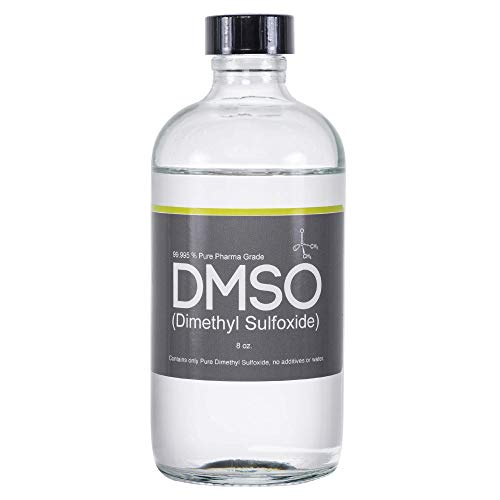 DMSO 8 oz. Glass Bottle Non-diluted 99.995% Low Odor Pharma Grade Liquid
DMSO 8 oz. Glass Bottle Non-diluted 99.995% Low Odor Pharma Grade Liquid
What is hair made of?
Hair is made of protein. So you can see the problem with malformed proteins or with diminished protein production due to thyroid malfunctioning. Specifically, hair is made of the protein keratin.If your thyroid gland is malfunctioning (due to iodine deficiency and bromine toxicity), then your body may re-prioritize how it produces proteins and de-prioritize the production of the hair protein keratin in favor of making sure that other, more vital proteins are repaired and maintained.
Cysteine and Amino Acids: The Building Blocks of Proteins
Amino acids are the building blocks of proteins and if you eat a vegan or vegetarian diet, you should consider the possibility that you aren’t getting enough protein or enough of the amino acids that you need to regrow hair. Also note that vitamin B12 deficiency can cause hair loss and though you may believe that you’re getting enough vitamin B12 as a vegan/vegetarian, note that vitamin B12 is one of the nutrients that Big Pharma is currently targeting as a Deficiency-Producing/Profitable Deficiency that is extremely hard to identify. Indeed, if you are deficient in iodine, you are susceptible to developing an array of digestive problems that will make it hard for your body to absorb vitamin B12 through the intestines. If you are over age 50 or if you have an inflammatory bowel disease or any kind of chronic digestive issue, you may want to consider supplementing with vitamin B12 by applying it topically to the skin using DMSO as a natural hair regrowth treatment in order to bypass the digestive system. Vitamin B12 deficiency is related to iodine deficiency via problems that iodine deficiency can cause in terms of digestion. So, if you’re trying to figure out how to regrow hair, consider applying daily doses of vitamin B12 + DMSO topically to the skin along with doing Lugol’s Iodine supplementation to troubleshoot the problem. Chances are, after 6 months of Lugol’s Iodine plus Vitamin B12+DMSO, your health will be exponentially improved and hair regrowth will be noticeable and active.
 L-Cysteine 1000mg | 100 Powder Capsules | Non-GMO, Gluten Free Supplement | by Horbaach
L-Cysteine 1000mg | 100 Powder Capsules | Non-GMO, Gluten Free Supplement | by Horbaach
How to Use Iodine Therapy to Treat Hair Loss
Iodine affects thyroid, liver, and gallbladder health in a variety of ways. Indeed, iodine is present in relatively high quantities in both bile and thyroid hormones. Iodine therapy is the most important treatment for anyone with thyroid problems, including thyroid problems that are affecting the digestive system. If you’re suffering from hair loss, it’s essential that you take iodine to both 1) ward off bromine toxicity and also to 2) ensure that you’re not Iodine Deficient.Iodine Therapy Supporting Nutrients
Click here to read more about iodine therapy and how to remove bromide and fluoride from the body. Begin to take these supporting nutrients 2 weeks before you begin Lugol’s iodine therapy for hair loss. If you have hyperthyroidism or hypothyroidism, begin taking these supporting nutrients 2 months before you begin taking iodine. By starting the supporting nutrient therapies first, you’ll hopefully ward off some of the Bromine Toxicity problems you may encounter later when you begin taking the Lugol’s 2%.- Selenium – 200 to 400 mcg/day – (assists with detoxification and thyroid secretion)
- Vitamin C – 2000 to 5000 mgs/day – take this supplement 4 to 6 hours AFTER iodine
- Magnesium – 400 - 600 mg/day
- Vitamin B3 - 500 mg per day - This nutrient is also essential for those with hypothyroidism or hyperthyroidism. It is also very beneficial for those without a known thyroid issues.
- Vitamin B2 - 400 mg per day - This nutrient dosage is absolutely essential for anyone with hypothyroidism or hyperthyroidism. It can be extremely beneficial to those without thyroid problems.
- Zinc / Copper - 15 mg / 2 mg
- Sea Water Supplement - 1 tsp. per 8 ounces of water
- Unrefined salt / Celtic or Himalayan sea salt – ½ tsp per day in ½ c. water followed by 12 oz. of water – the salt binds to bromine and assists in detoxification
Additional Cures for Hair Loss: The AlivenHealthy Living Database
The AlivenHealthy Living Database of Alternative Medicines and our Living Database of Essential Oils is now available by subscription. Currently our database of alternative medicines with links to scientific research along with our database of essential oil treatments for diseases are available by subscription. Our databases are "alive" and "living" because we add to them daily with new links to scientifically proven cures for diseases, treatments for serious injuries, disorders, mental health problems, and even natural alternatives in terms of insect repellants and sunscreens (for example). It has become more and more difficult to find this information through a search engine so we decided to make these databases available to the public so they can find the documented cures for diseases that we've been studying for years. Also, consider downloading our package that includes The Psoriasis Cure and The Gallbladder as a book bundle to begin working with the core issues underlying hair loss.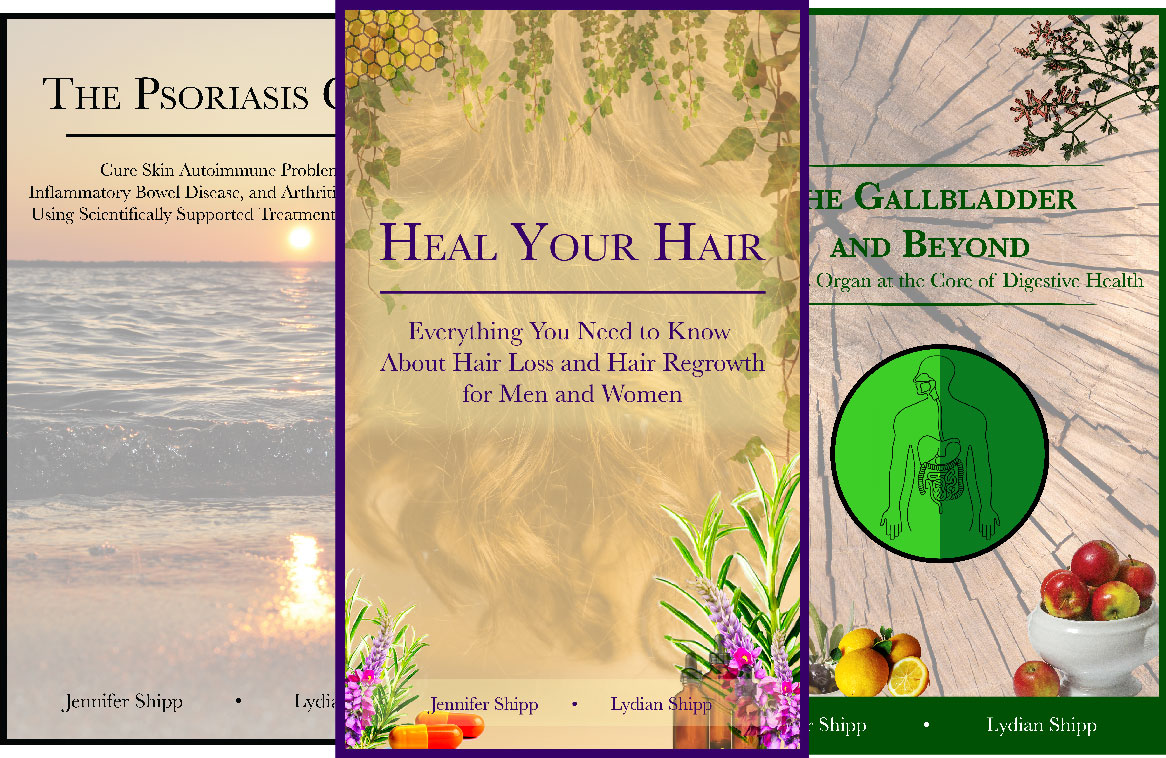
The Complete Hair Loss and Hair Regrowth BOOK BUNDLE - Buy Here!
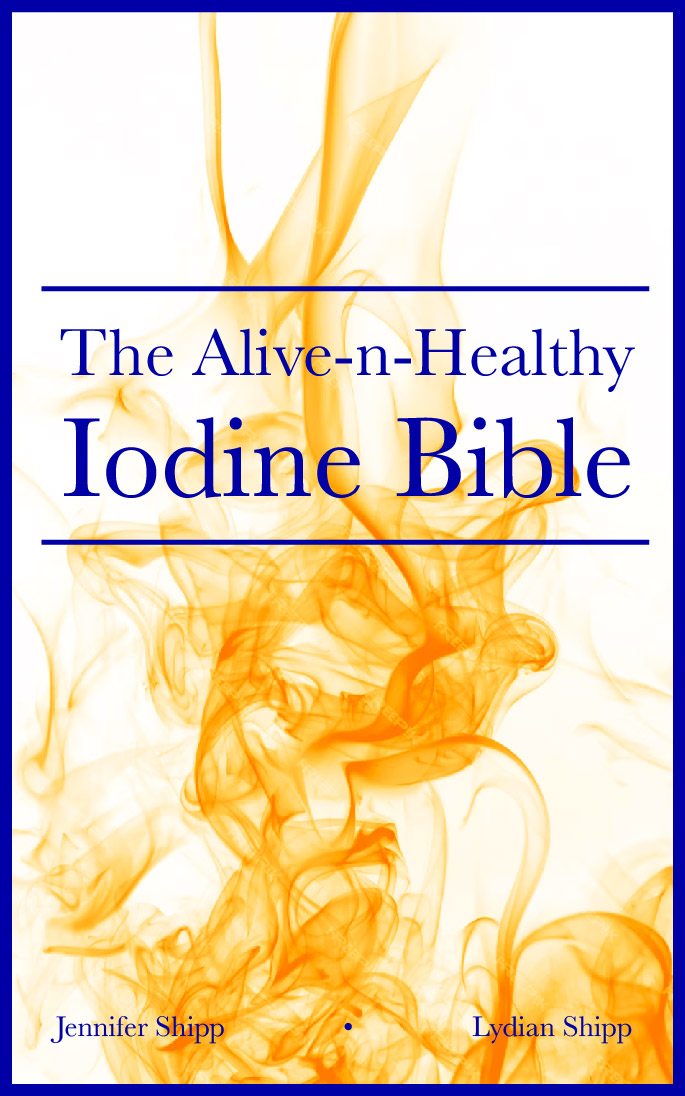
The AlivenHealthy Iodine Bible - Everything you need to know to get started taking iodine and more!
Resources:

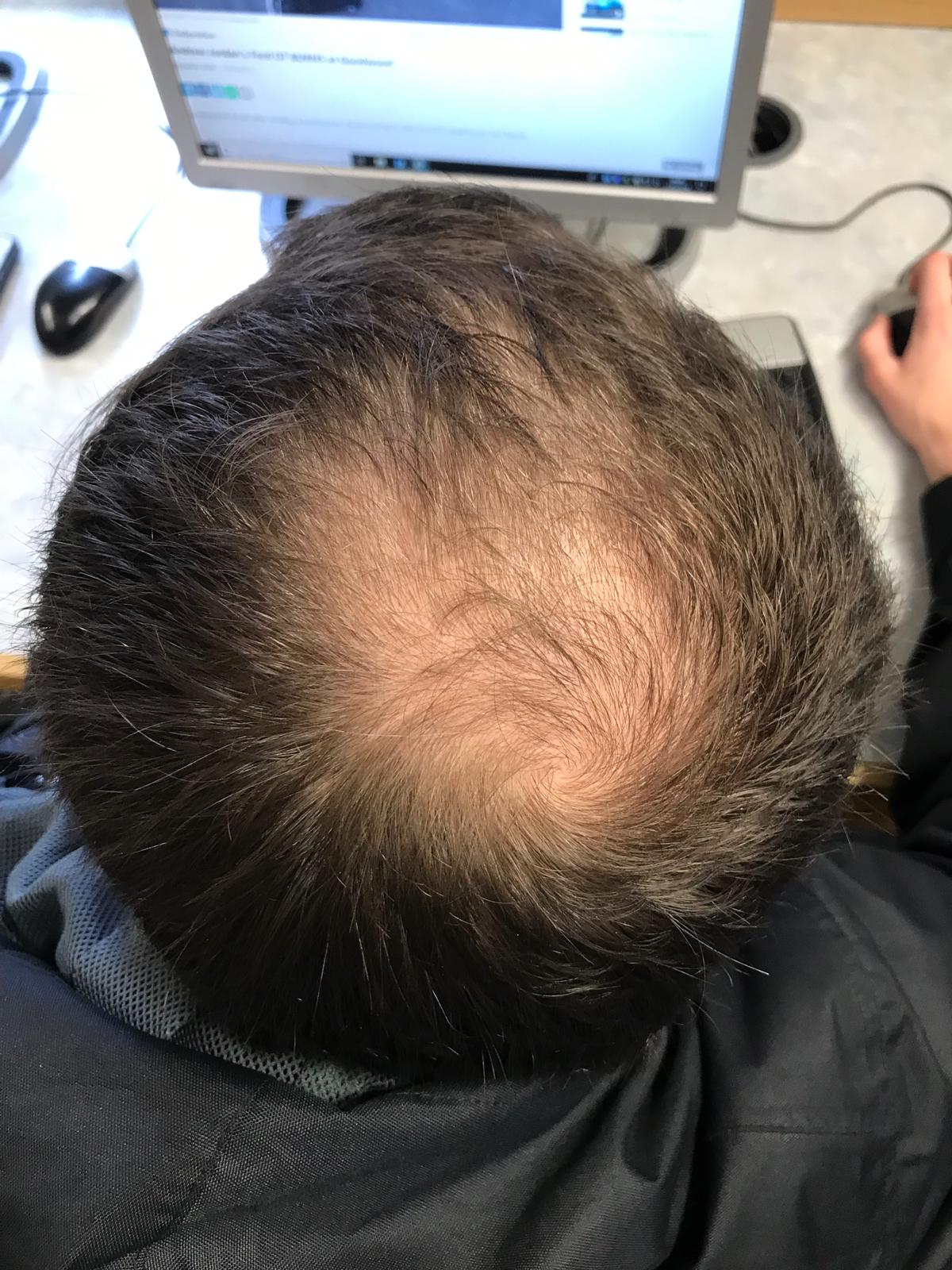 Big Pharma-sponsored content adamantly claims that there is no relationship between Iodine Deficiency and hair loss. I suppose that's because Big Pharma makes a lot of money off hair loss drugs that don't work to regrow hair, but also that make people with hair loss sicker. I've worked with clients in the past who took prescription and over-the-counter hair loss drugs only to later develop serious problems like neuropathy or pudendal neuralgia. If you're looking for a natural hair loss remedy, Iodine Therapy with vitamin B12 and Cysteine are an excellent place to start!
Big Pharma-sponsored content adamantly claims that there is no relationship between Iodine Deficiency and hair loss. I suppose that's because Big Pharma makes a lot of money off hair loss drugs that don't work to regrow hair, but also that make people with hair loss sicker. I've worked with clients in the past who took prescription and over-the-counter hair loss drugs only to later develop serious problems like neuropathy or pudendal neuralgia. If you're looking for a natural hair loss remedy, Iodine Therapy with vitamin B12 and Cysteine are an excellent place to start! BULKSUPPLEMENTS.COM Vitamin B12 1% Methylcobalamin Powder - Energy Vitamins - B12 Vitamins - Vegan B12 - B12 Supplement (50 Grams - 1.8 oz)
BULKSUPPLEMENTS.COM Vitamin B12 1% Methylcobalamin Powder - Energy Vitamins - B12 Vitamins - Vegan B12 - B12 Supplement (50 Grams - 1.8 oz)


















